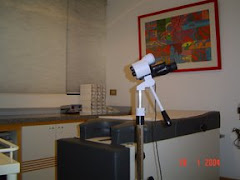
Estudos com aproximadamente 300.000 pacientes mostraram, que os pacientes que faziam parte do grupo daqueles pacientes com os níveis mais elevados das pressões sistólica (máxima) e diastólica (mínima), tem o dobro de risco para apresentar Carcinoma de Célula Renal, um tipo de tumor maligno (câncer) que pode acometer os rins.
Veja artigo na íntegra, publicado na REUTERS Health Information:
"High Blood Pressure Linked to Kidney Cancer Risk"
By Will Boggs, MD
NEW YORK (Reuters Health) Mar 04 - Uncontrolled high blood pressure is associated with an increased risk of developing renal cell carcinoma (RCC), according to a report in the February 15th issue of the American Journal of Epidemiology.
"Hypertension is an important risk factor of RCC, accounting for approximately 20%-30% of cases," Dr. Steffen Weikert from the German Institute of Human Nutrition Potsdam-Rehbruecke, Nuthetal, told Reuters Health. "Adequate control and prevention of elevated blood pressure may lower the incidence of RCC."
Dr. Weikert and colleagues in the European Prospective Investigation into Cancer and Nutrition examined the relation between blood pressure and risk of RCC, taking into account such other important risk factors as obesity, smoking, and the use of antihypertensive medication.
The study included nearly 300,000 subjects in eight countries, whose blood pressure was measured in 1992-1998. During a mean of 6.2 years of follow-up, 250 cases of RCC occurred.
The risk of RCC was more than doubled for patients in the highest categories of both systolic and diastolic blood pressure (relative risks 2.48 and 2.34, respectively) compared with those in the lowest categories of systolic and diastolic blood pressure, the authors report.
The risk estimates associated with diastolic (but not systolic) blood pressure were somewhat higher for men than for women in the highest category, the report indicates.
There appeared to be no interactions between blood pressure and smoking or body mass index, and, in fact, the increased RCC risk related to obesity was mild and nonsignificant in the absence of markedly elevated blood pressure.
"Individuals taking antihypertensive drugs were not at a significantly increased risk unless blood pressure was poorly controlled," the researchers note.
"Hypertensive kidney damage (scarring/glomerulosclerosis), oxidative stress/lipid peroxidation, and up-regulation of hypoxia inducible factors (HIF) and hypoxia-inducible genes may contribute to malignant transformation/progression," Dr. Weikert explained.
Further studies are planned, Dr. Weikert added, "to characterize the up-regulation of hypoxia-inducible genes and features of lipid peroxidation in adjacent normal renal tissue of RCC patients with a history of hypertension as compared to those without, to investigate the association between biomarkers of lipid peroxidation and RCC, and to study the role of hypertension in relation to prognosis of RCC patients."
"Hypertension is an important risk factor of RCC, accounting for approximately 20%-30% of cases," Dr. Steffen Weikert from the German Institute of Human Nutrition Potsdam-Rehbruecke, Nuthetal, told Reuters Health. "Adequate control and prevention of elevated blood pressure may lower the incidence of RCC."
Dr. Weikert and colleagues in the European Prospective Investigation into Cancer and Nutrition examined the relation between blood pressure and risk of RCC, taking into account such other important risk factors as obesity, smoking, and the use of antihypertensive medication.
The study included nearly 300,000 subjects in eight countries, whose blood pressure was measured in 1992-1998. During a mean of 6.2 years of follow-up, 250 cases of RCC occurred.
The risk of RCC was more than doubled for patients in the highest categories of both systolic and diastolic blood pressure (relative risks 2.48 and 2.34, respectively) compared with those in the lowest categories of systolic and diastolic blood pressure, the authors report.
The risk estimates associated with diastolic (but not systolic) blood pressure were somewhat higher for men than for women in the highest category, the report indicates.
There appeared to be no interactions between blood pressure and smoking or body mass index, and, in fact, the increased RCC risk related to obesity was mild and nonsignificant in the absence of markedly elevated blood pressure.
"Individuals taking antihypertensive drugs were not at a significantly increased risk unless blood pressure was poorly controlled," the researchers note.
"Hypertensive kidney damage (scarring/glomerulosclerosis), oxidative stress/lipid peroxidation, and up-regulation of hypoxia inducible factors (HIF) and hypoxia-inducible genes may contribute to malignant transformation/progression," Dr. Weikert explained.
Further studies are planned, Dr. Weikert added, "to characterize the up-regulation of hypoxia-inducible genes and features of lipid peroxidation in adjacent normal renal tissue of RCC patients with a history of hypertension as compared to those without, to investigate the association between biomarkers of lipid peroxidation and RCC, and to study the role of hypertension in relation to prognosis of RCC patients."











Nenhum comentário:
Postar um comentário